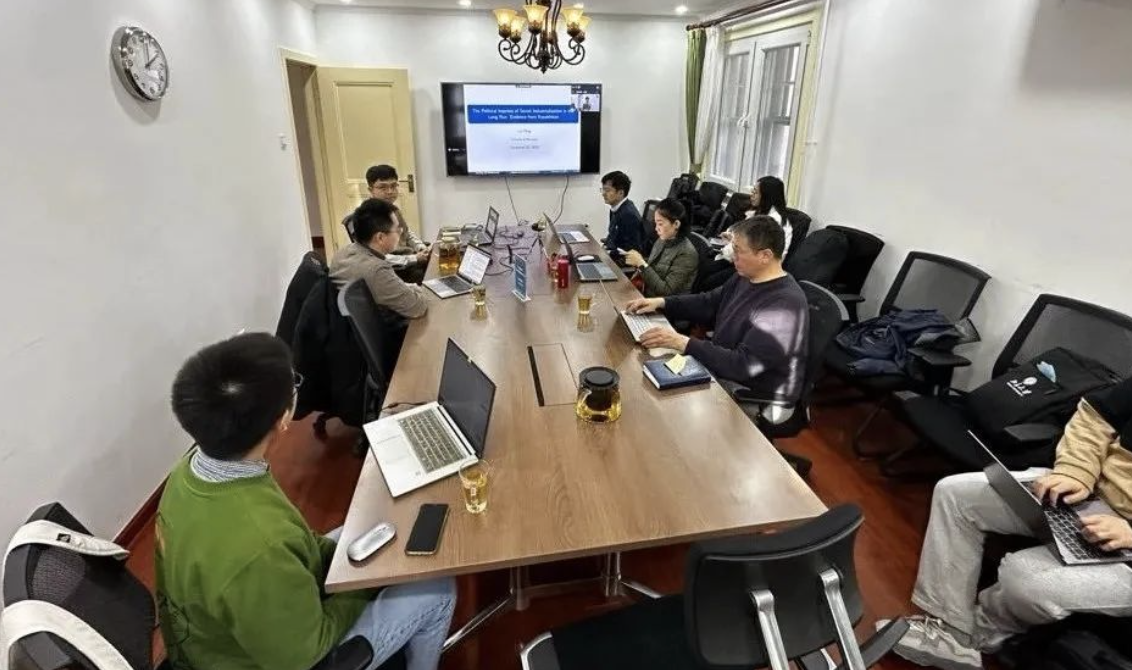
The 7th lecture of the Youth Salon of the Institute of Area Studies, Peking University (PKUIAS), entitled “Historical Imprints of Soviet Industrialization: Field Evidence Based on Kazakhstan and Armenia,” was held on December 22, 2023. The lecture was given by Peng Liu, a PhD candidate from the Department of Political Science of the University of Minnesota, and moderated by Shi Yue, an assistant professor from the School of Foreign Languages, PKU. Fei Haiting, an assistant professor from the School of Government, and Kang Jie, an associate research fellow from the China Institute of International Studies, were commentators.
Based on his field research experiences in Kazakhstan and Armenia, Peng Liu discussed how industrialization in the Soviet era affected public opinion and political attitudes in the current post-Soviet space.
Peng Liu categorized this research as the study of historical legacies in political science. He found that the inhabitants of the industrial zones of the former Soviet Union today have a distinctive political culture of the “Rust Belt.” He hypothesized that the working class, who were the relative beneficiaries of the system during the Soviet period, would develop a nostalgic feeling for the Soviet system and become more eager to participate in political discourse after experiencing a drastic decline in their status following the disintegration of the Soviet Union. This hypothesis was tentatively confirmed in his fieldwork.
Peng Liu used the proportion of worker party members to local party members to identify the degree of industrialization in a region and predicted respondents’ political attitudes by their proximity to large Soviet-era factories. It was found that the closer the respondents were to the factories, the less they trusted the regime, the more they expected redistributive and egalitarian economic relations, the more they tended to participate in demonstrations and strikes, and the more eager they were to participate in political discussions. The causal mechanism is mainly accomplished through archival materials and oral history research. Peng Liu examined the wage and welfare facilities of Soviet factory workers and their changes after the disintegration of the Soviet Union through archival materials. He also learned about the changes in the working and living conditions of factory workers through field interviews. The preliminary conclusion of the study is that the residents of the old industrial cities of the Soviet Union were given a relatively privileged material life, which contrasted with the decline in living conditions and status after the disintegration of the Soviet Union, thus creating a sense of resentment and a unique political culture among these Rust Belt workers. This provides an explanation for the tearing apart of political and social opinion in Eurasia today.
Peng Liu then shared his experience of fieldwork in Kazakhstan and Armenia. In terms of archival research, he detailed the process of searching archives and pointed out that there were differences in the availability of archival information in the post-Soviet countries, with the Baltic States having the most accessible archives, followed by Armenia and Georgia, Kazakhstan, and Russia, Belarus, and Uzbekistan. In Kazakhstan, some local archives have easier access to archives than the central archives. In terms of field interviews, Peng Liu viewed that it was important to pay attention to the sensitivity of political topics, and at the same time to be a good listener, so as to win a high probability of obtaining a more positive response from interviewees. He pointed out that there were subtle differences between oral interviews conducted by Chinese scholars in Eurasia and those conducted by European and American scholars.
During the discussion, Fei Haiting expressed his belief that this study reflected Peng Liu’s solid foundation in social science research, foreign language research ability and humanistic literacy, and that the content and methodology of the study reflected a clear sense of discipline and field. Kang Jie pointed out that Peng Liu's report was informative and his research methodology was diversified, and suggested that he could extend his thinking in the direction of international relations on the basis of this research. Dan Yang of the School of Politics and Public Administration of Xinjiang University said that Peng Liu has a clear sense of the content and direction of his research, and that his empathy for the workers in the Rust Belt adds to the attractiveness of this research. Dong Yu, a postdoctoral fellow at PKU’s Department of History, pointed out the importance of conducting systematic social science research on people’s “nostalgia for the Soviet Union” in the post-Soviet space. Shi Yue argued that Peng Liu’s research focused on the common dilemma of people in the inland industrial and mining cities of Eurasia under the trend of globalization after the end of the Cold War. He pointed out that academic research emphasized curiosity and honesty, and that Peng Liu’s field experience of documentary work and oral interviews was invaluable and worthy of reference for researchers.


